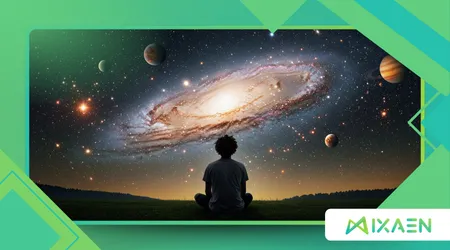What If We Are the Universe Observing Itself?

Universe observing itself a concept that sparks curiosity, blending science, philosophy, and spirituality into a profound question about existence.
Anúncios
What if consciousness is not merely a human trait but a cosmic phenomenon, where the universe gazes upon its own essence through us?
This idea challenges our understanding of reality, urging us to explore our place in the cosmos. From quantum physics to ancient mysticism, the notion that we are the universe observing itself invites us to rethink identity, perception, and purpose.
In this exploration, we’ll dive into the scientific, philosophical, and cultural dimensions of this idea, weaving together insights that resonate in 2025’s ever-evolving intellectual landscape.
The question captivates because it bridges the tangible and the abstract, the measurable and the mysterious.
It’s not just a thought experiment; it’s a lens through which we can examine our role in a vast, interconnected cosmos.
As we navigate this topic, we’ll uncover how modern science, timeless wisdom, and human experience converge to suggest that we might be the universe’s way of reflecting on its own existence. Let’s embark on this journey with open minds, ready to question and connect.
The Science of Cosmic Self-Observation
Quantum mechanics offers a tantalizing clue to the idea of the universe observing itself. The observer effect suggests that observation alters reality at the subatomic level.
When a particle is measured, its state collapses into a definite form, implying consciousness plays a role in shaping existence.
A 2023 study from the University of Cambridge showed that quantum entanglement might link conscious observation to physical outcomes, raising questions about our role in reality’s fabric.
This isn’t just lab talk. Consider the double-slit experiment: particles behave differently when observed, acting as waves or particles based on attention. It’s as if the universe requires a witness to define itself.
This phenomenon hints that consciousness might be integral to the cosmos, not a byproduct. Could we, as conscious beings, be the mechanism through which the universe observes itself?
++ The Role of Observer in Quantum Mechanics
The implications are staggering. If observation shapes reality, then human consciousness might be a cosmic tool, not a random occurrence.
Scientists like Max Tegmark argue that the universe’s mathematical structure suggests a self-referential system, where consciousness emerges to interpret its own patterns.
This perspective aligns with the idea that we are not separate from the cosmos but integral to its self-awareness.

Philosophical Roots of Cosmic Consciousness
Philosophy has long grappled with the universe observing itself. Ancient thinkers like Heraclitus saw the cosmos as a dynamic, self-aware entity, with humans as its reflective agents.
In 2025, this idea resonates with panpsychism, the view that consciousness is a fundamental property of matter. Philosophers like Philip Goff argue that even particles might possess rudimentary awareness, forming a cosmic web of sentience.
Imagine a mirror reflecting itself infinitely our minds might be such mirrors, capturing the universe’s essence.
This analogy suggests that our thoughts and experiences are not isolated but part of a larger cosmic narrative.
Also read: The Fermi Paradox: Where Are All the Aliens?
Panpsychism challenges the materialist view, proposing that consciousness isn’t exclusive to humans but a universal trait, making us the universe observing itself.
The philosophical debate isn’t abstract; it shapes how we view our purpose. If we are the universe’s eyes, our choices and reflections carry cosmic weight.
This perspective invites us to live with intention, knowing our actions ripple through a self-aware cosmos, connecting us to something greater than ourselves.
Cultural and Spiritual Reflections
Across cultures, the universe observing itself echoes in spiritual traditions. In Hinduism, the concept of Atman the individual soul merging with Brahman, the universal consciousness suggests we are the cosmos experiencing itself.
The Upanishads, ancient texts from 800 BCE, describe this unity, a idea still vibrant in 2025’s spiritual dialogues.
Buddhism’s concept of interdependence mirrors this. Thich Nhat Hanh’s teachings emphasize that we “inter-are” with the universe, our existence intertwined with stars and galaxies.
Read more: Can We Ever Know the Truth About the Universe?
Picture a single leaf on a tree, aware of the forest’s entirety this is us, reflecting the cosmos through our lives. Such perspectives inspire mindfulness, urging us to see ourselves as part of a greater whole.
Modern spiritual movements, like those explored in 2025’s global wellness summits, embrace this unity. Practices like meditation and psychedelics, increasingly studied for their consciousness-expanding effects, suggest we can tap into this cosmic self-awareness.
These traditions remind us that the universe observing itself is not just a theory but a lived experience, accessible through introspection.
The Role of Technology in Cosmic Awareness
In 2025, technology amplifies our ability to explore the universe observing itself. AI, like advanced models studied at MIT, mimics human cognition, raising questions about artificial consciousness.
If machines can “think,” are they too part of the universe’s self-observation? This question pushes us to redefine consciousness in a tech-driven world.
Telescopes like the James Webb Space Telescope, operational since 2022, reveal the universe’s origins, letting us peer into its past.
Each image we capture is the universe reflecting on its own history through human ingenuity. It’s as if we’re holding a cosmic mirror, seeing the universe observing itself through our tools.
Virtual reality and neural interfaces, gaining traction in 2025, deepen this connection. By simulating cosmic experiences, they allow us to “feel” the universe’s vastness.
These technologies suggest that our creations are extensions of cosmic consciousness, enabling the universe to explore itself through human innovation.
The Human Experience as Cosmic Reflection
What does it mean to be the universe observing itself in daily life? Every thought, emotion, and action becomes a cosmic event.
When you gaze at a starry sky, you’re not just seeing the universe you’re the universe seeing itself. This perspective transforms mundane moments into profound acts of cosmic self-awareness.
Consider Jane, a teacher in 2025, who inspires her students to question reality. Her lessons on cosmology spark curiosity, making her a conduit for the universe’s self-reflection.
Or think of Miguel, an artist whose paintings capture cosmic beauty, inviting viewers to see themselves as part of the cosmos. These examples show how ordinary lives embody this grand idea.
Statistically, a 2024 Pew Research survey found 68% of people believe humans are connected to a larger cosmic purpose, reflecting growing acceptance of this idea.
This belief shapes how we live, encouraging empathy and curiosity. Isn’t it awe-inspiring to think your every action might be the universe contemplating itself?
Table: Key Concepts in Cosmic Self-Observation
| Concept | Description | Relevance to 2025 |
|---|---|---|
| Quantum Observer Effect | Observation alters particle behavior | Links consciousness to physical reality |
| Panpsychism | Consciousness is a universal property | Challenges materialist views of existence |
| Atman-Brahman Unity | Individual soul merges with universal consciousness | Inspires spiritual practices globally |
| AI Consciousness | Machines may mimic or possess awareness | Redefines cosmic awareness in tech era |
Implications for Our Future
If we are the universe observing itself, what does this mean for 2025 and beyond? It suggests a responsibility to act with awareness, knowing our choices shape the cosmos’s self-perception.
Environmental efforts, like global reforestation projects, become acts of cosmic stewardship, preserving the universe’s ability to reflect through life.
This idea also fuels innovation. Scientists developing quantum computers in 2025 aim to mimic the universe’s complexity, potentially creating systems that enhance its self-awareness.
Such advancements could lead to a future where technology and consciousness merge, deepening the universe’s self-exploration.
Ethically, this perspective demands we consider AI and biotech’s impact. If consciousness is universal, our creations must respect this interconnectedness.
By aligning technology with cosmic awareness, we ensure the universe’s self-observation evolves ethically, fostering a future of harmony and insight.
Frequently Asked Questions
Q: How does the observer effect relate to the universe observing itself?
A: The observer effect in quantum mechanics suggests that observing a particle changes its state, implying consciousness shapes reality, making us the universe observing itself.
Q: Can technology like AI be part of cosmic self-observation?
A: Yes, AI’s ability to process and reflect on data could extend the universe’s self-awareness, acting as a tool for cosmic introspection in 2025.
Q: Is the idea of the universe observing itself scientific or spiritual?
A: It’s both. Science supports it through quantum mechanics, while spiritual traditions like Hinduism and Buddhism offer complementary perspectives on cosmic unity.
This exploration of the universe observing itself invites us to see ourselves as integral to the cosmos, not separate from it.
From quantum experiments to spiritual insights, the idea weaves a tapestry of meaning, urging us to live with purpose and curiosity in 2025.
As we reflect, create, and innovate, we embody the universe’s quest to know itself, making every moment a cosmic act of self-discovery.
